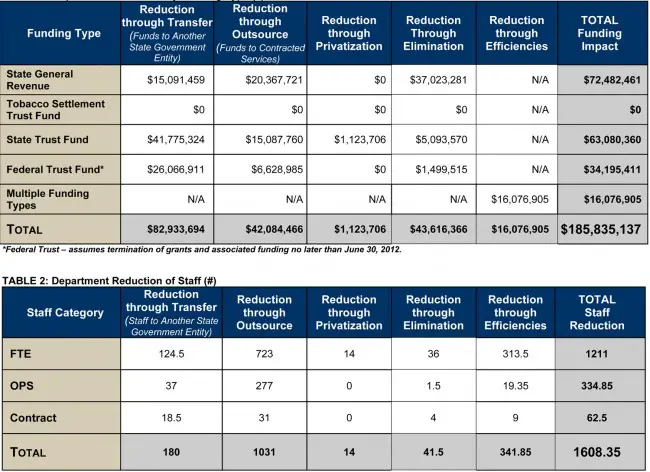
Under fire from lawmakers, the Florida Department of Health has proposed a sweeping plan to reorganize — and shrink — its operations. Among other things, it would move the state out of the primary-care business.
The recommendations, released in a 154-page report late Tuesday afternoon, call for cutting 1,608 department jobs and consolidating dozens of divisions and bureaus. One of the proposals would buck the powerful doctors’ lobby by lifting a requirement that the department secretary be a physician.
“The department requires an agency head with strong leadership and operational management skills to plan, direct, coordinate, and execute the powers, duties, and functions vested in the department,” the report said.
The reorganization would lead to many department duties being shifted to other state agencies, privatized or eliminated altogether.
Click On:
- As County Health Departments Brace For Cuts in Vital Services, Flagler’s Makes Its Case
- The Department of Health’s Full Report
- Dismantled or Reorganized, It May Be the End of the Department of Health As We Know It
- Floridians, Start Your Orwells: Rick Scott’s Buzzword-Assault on State Health Care
In one major change, the report calls for the state to stop paying for primary-care services at county health departments. The proposal would save about $22.3 million and comes as some state officials want to rely more on federally qualified health centers to provide primary care.
In another big change, the report calls for contracting with a private company to run at least part of the Children’s Medical Services program. CMS serves children who have a variety of serious medical conditions.
[Patrick Johnson, administrator of the Flagler County Health Department, had not yet fully digested the report Wednesday morning, but said its impact may be limited for two reasons: Medicaid reimbursement rates have not yet been set, and won’t be set until the Legislature meets later this month. Those rates enable the department to provide most of its services, including primary care. And two local job reductions that may be required according to the state plan may be taken care of by attrition. “One position we have vacant, and has been vacant–that’s easy to eliminate,” Johnson said. “Another, we had another person resign and move on to another employment last week.” The local health department had 66 positions. From his reading of the report so far, Johnson said, “quite a bit of it doesn’t impact us.” He’ll be meeting Thursday with state officials to further gauge the report’s impact.]
State lawmakers last year required the department to conduct a review of its operations and come up with recommendations for possible changes. House leaders, in particular, have been highly critical of the department, contending that it is unfocused and has taken on too many roles over the years.

While the department worked on the recommendations, new Gov. Rick Scott’s transition team also issued a blistering appraisal of the agency. Some of the transition team’s recommendations — such as moving away from primary care and allowing a non-physician to serve as department secretary — are evident in the report.
But many public-health advocates have worried that changes in the department would go too far. As an example, they expressed repeated concerns last year that changes would gut prevention and education programs.
The report calls for making major changes in the department’s organizational chart, going from 11 divisions to six and 50 bureaus to 18. Programs would be moved around to fit under the new framework.
Also, many programs would be moved to other state agencies, including the Department of Children and Families, the Department of Environmental Protection and the Agency for Health Care Administration.
Other programs would be farmed out to private contractors or see their funding disappear. Many of the programs targeted for elimination serve only specific geographic areas of the state.
But some cuts would have broader reach, such as the proposed elimination of $4.8 million for the Area Health Education Centers Network, which is involved in anti-smoking programs. The report says the so-called AHECs could pursue other sources of money.
In all, the report calls for eliminating 1,608 department jobs, though at least 180 would shift to other state agencies. It was not immediately clear Tuesday how many of the targeted jobs might be vacant.
Lawmakers required the department to submit the report by Tuesday, a week before the start of the 2011 legislative session. That would provide time for the Legislature to consider changes this year.
Scott’s transition team went further than the report’s recommendations and called for a merger of the department with the Agency for Health Care Administration. Scott administration officials have said the idea is still being considered, though lawmakers have not publicly taken it up.
–Jim Saunders, Health News Florida





























kevin says
As it should be given the ineptness of our governments to work with the same efficiencies as their private counterparts yet demand, no, require through threats and intimidation attacks compensation packages that are out of proportion for the effort and skills they bring to the table. All the while with little or no accountability, the ongoing problem with many government employees and departments, bloated wasteful government programs morph and metastasize into the tax-dollar leeches they become.
If these public employees are as valuable as they claim they are, let their sorry asses be first to be hired in the new companies. If they are as good as they threaten us they are, they should go from salad chef to CEO in no time. I for one am open to the prospects of attempting such cuts to these wasteful programs if it means curtailing hemorrhaging taxpayer dollars due to government programs like these that may also overlap, and at the same time funding public unions.
Let’s take some of the savings and redirect it here in the state of Florida, to better and well qualified teachers, elevating their compensation. But at the same time, hold them accountable and not allow them to become public employee slugs, with no motivation to improve on their professional skills and output, which is better performing students. They don’t rip us off when the schools fail to keep up with other countries around the world, they rip off the children. Let’s give them the salaries they seek, within reason, and hold them accountable for their ongoing failure. In the end it will come full circle by showing compensation was never the problem with our schools in the first place. The lack of competition and motivation within the system is.
NortonSmitty says
Kevin, Please! Just drink the Kool-Aid out of your little sippy-cup and shut up already!